From 'Road Trip' to 'Search Party': Writer-Turned-Director Scot Armstrong's Hollywood Journey

Unless you’re a comedy and/or screenwriting nerd, you probably don’t know the name Scot Armstrong. You definitely know his credits, though. Armstrong has been one of Hollywood’s most prolific — and most successful — comedy writers of the millennium, penning hits like Road Trip, Old School, and The Hangover Part II along with frequent partner-in-crime Todd Phillips.
Now he’s making his directorial debut with Search Party, a reliably raunchy R-rated comedy about two bros (T.J. Miller and Adam Pally) who head south of the border to save a third (Thomas Middleditch) after he’s been carjacked and stripped of all his belongings, including his clothes.
“I didn’t get into [writing] to be like, ‘Okay, this is a long con to trick people into letting me direct movies later on in life,’” said the 45-year-old native of suburban Chicago. “Thinking of ideas is like the only thing I can really do in my life. It’s where I’m at my best, I feel like. I could be a failure at every other task in the world, but it’s the one thing I love to do.”
During a recent sit-down at a Beverly Hills hotel, Armstrong walked us through the progression — and highlights — of his colorful career so far.
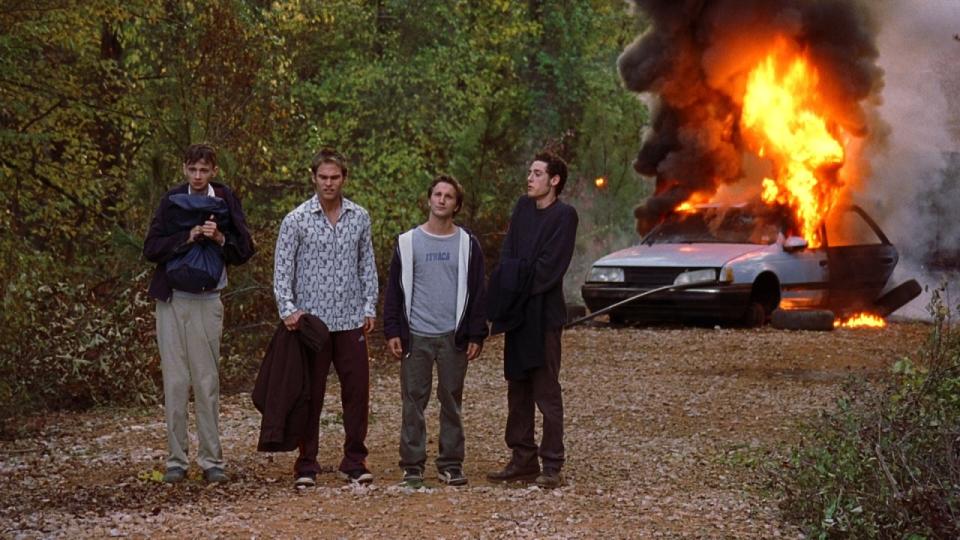
Road Trip (2000)
Armstrong, who has studied and performed improv for 20 years (Second City, ImprovOlympic, Upright Citizens Brigade), was working in advertising in Chicago, one of his first gigs after graduating from Bradley University. There he hired a budding filmmaker named Todd Phillips, who had just won the Grand Jury Prize at Sundance for his hazing documentary Frat House, to shoot a commercial. “We met, hit it off, stayed up all night making each other laugh talking about the state of comedy,” Armstrong recalled. “And we started kicking ideas around on how to work with each other.”
Phillips had just met legendary comedy writer-director-producer Ivan Reitman at Sundance, and the Ghostbusters vet told the upstart he was looking for pitches for an “Animal House on the road”-type comedy. So the new writing partners put together a treatment, and Armstrong called in sick to fly to Los Angeles for the pitch. Reitman took it. “I sold a treatment, which was so nothing,” Armstrong said. “But I was like, I quit my job! I’m moving to New York! I made it! It was so ridiculous, just the optimism.”
The optimism wasn’t fully unwarranted. Road Trip is about an Ithaca University student (Breckin Meyer) who accidentally mails his ex-girlfriend a sex tape and, with the help of some friends (Seann William Scott, DJ Qualls, and Paulo Costanzo), must speed down to Texas to intercept it. The movie received solid reviews and became a sleeper hit at the box office, earning $68 million on a $15 million budget.
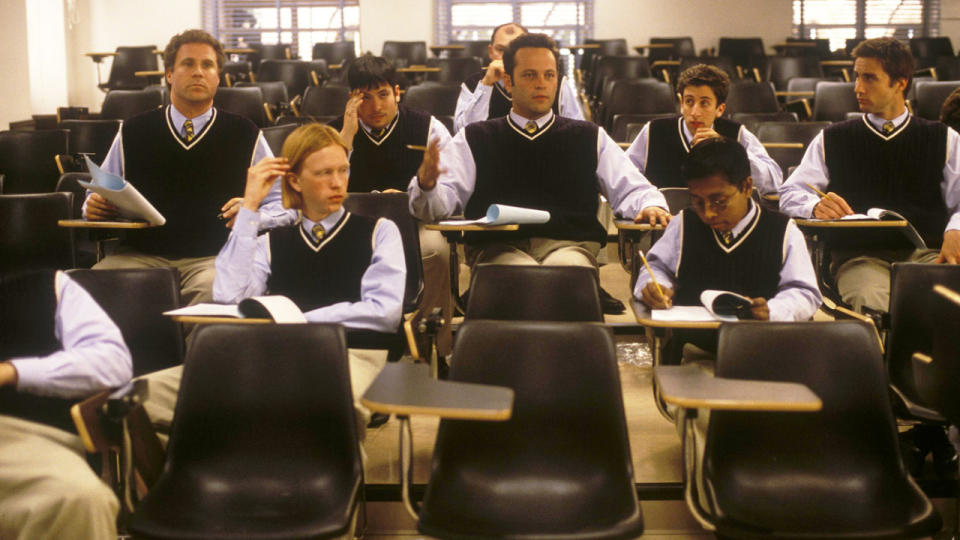
Old School (2003)
Phillips’ and Armstrong’s next comedy felt like a natural follow-up: whereas Road Trip captured the male college experience, Old School studied men nearing middle age who longed for the rowdier days of their pasts. But it wasn’t strategic. “It is kind of random how these things come about, we didn’t set out to do something that was a sister movie to Road Trip or anything,” Armstrong explained. “We were just looking for anything else that was great to take on.”
You’ll now find the movie’s poster plastered across dorm rooms nationwide (right next to John Belushi in Animal House), but it was never thematically geared toward that demographic, either. “It wasn’t so much a movie about college, really — now it’s kind of famous for that — but it was always a story about these three guys who shouldn’t be going backwards. Going backwards and trying to believe too much in nostalgia and relive something almost never works.”
Armstrong could tell the comedy, which helped establish the so-called “Frat Pack” and starred Will Ferrell, Vince Vaughn, and Luke Wilson as thirtysomethings who create an unsanctioned fraternity, was special from the get-go. Buddy comedies were still en vogue at the time, but this stood out as a three-hander, and every grown man can relate to the desire to turn back the clock. He was right: The movie became an endlessly quoted comedy hit.
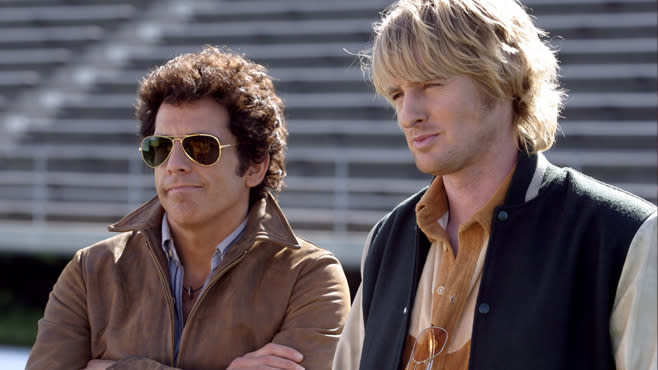
Starsky & Hutch (2004)
Armstrong, who also did uncredited writing on the beloved 2003 holiday comedies Elf and Bad Santa, entered new terrain/hallowed ground with this action-comedy adaptation of the popular '70s cop show starring Ben Stiller and Owen Wilson and directed once again by Phillips. Though they’re ubiquitous today, big-screen remakes of TV programs were still a relatively new phenomenon, though they’d be in high-demand after the success of 2002’s Charlie’s Angels.
Related: Watch Ben Stiller and ‘Zoolander 2′ Costars Respond to Questions on Yahoo Answers
“That was a wild movie to take on,” Armstrong remembered. “You’re basically inventing new characters, even though they already exist, because it is more of a comedy than the drama that it was [on TV]. So you’re making fun of the '70s and the kind of the style the show had, but at the same time you’re making a straight-up comedy… Plus, we had to create this whole mystery structure within the comedy.”
Starsky & Hutch continued Phillips’ and Armstrong’s upward trend in box-office receipts, grossing $88 million. And while it doesn’t hold as lofty a position in the comedy zeitgeist as Old School, Armstrong said he encounters a surprising number of its fans to this day. “People talk about that movie more than you would think,” he said. “A lot of people love that movie. It’s just one of those movies that holds up when you watch it again.”
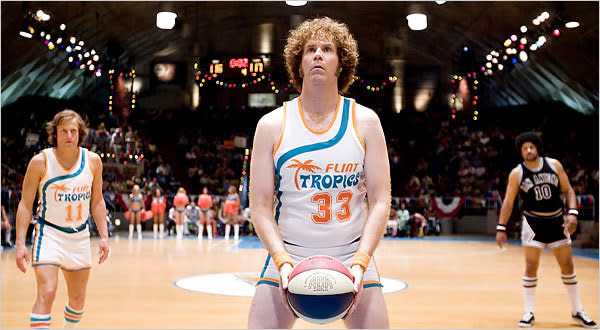
Semi-Pro (2008)
Armstrong reteamed with Phillips for 2006’s underperforming School for Scoundrels and collaborated with the Farrelly brothers on their 2007 remake of 1972’s The Heartbreak Kid. But Semi-Pro, a retro-comedy starring Will Ferrell as an American Basketball Association star, marked his first solo credit. And it was a major-league passion project for him.
“That was like my dream come true to make that movie, because it was based on a real time period that I was obsessed with,” said Armstrong, who consumed documentaries about the ABA and modeled the film after '70s sports comedies like Slapshot and North Dallas Forty. “I won’t put Semi-Pro in that league, but it was definitely an homage to that style of comedy… It was hard to nail the tone because the '70s were so crazy and the ABA league was so crazy in itself that it seemed like a put-on. Sometimes you film something that actually happened and it seems too crazy, too fake.”
Semi-Pro wasn’t a big hit, but Armstrong still sees its fans rear their heads. Nearly every Halloween, he said, he’ll come across someone dressed as a Flint Tropic.
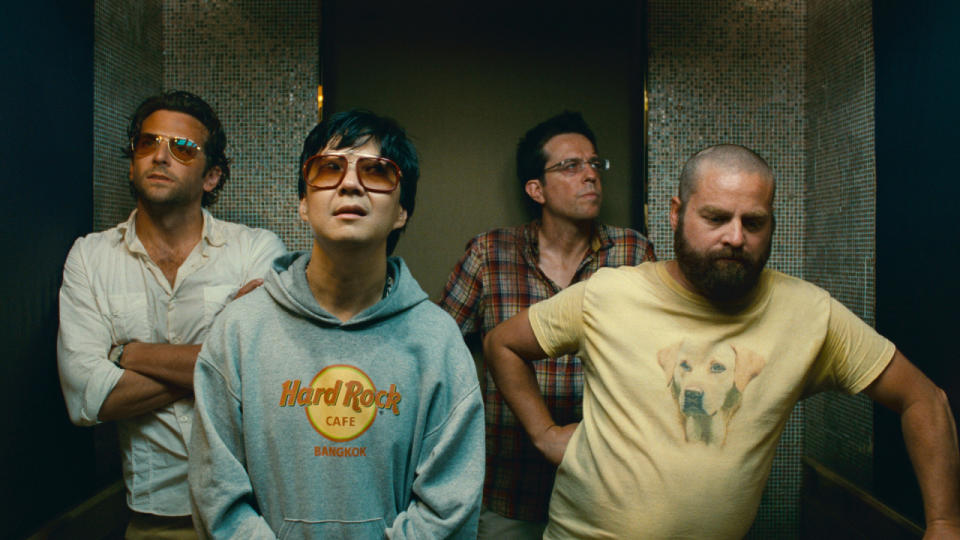
The Hangover Part II (2011)
Speaking of big hits… Armstrong did not write the first Hangover movie, but his pal Phillips directed it (based on a script from Jon Lucas and Scott Moore). And Armstrong had struck a deal even before The Hangover was made that if it was ever released, he would tackle the sequel. “Then it comes out and becomes the biggest grossing comedy of all time,” he said. "And now we’re saddled with the sequel, to live up to these impossible expectations.“
Armstrong called the experience of working on the sequel, with Phillips and Craig Mazin (co-host of the essential screenwriting podcast ScriptNotes) the most fun he’s ever had writing. "How do you heighten one of the most heightened movies ever? So we went to Bangkok,” he said of the sequel that reteamed Bradley Cooper, Ed Helms, and Zach Galifianakis for more fuzzy-brained shenanigans.
The movie became Armstrong’s biggest grosser by a mile, earning $254 million. Still, some fans and critics complained that the plot too closely resembled the first. “We had originally tried to do something without them not remembering something, to do something completely different,” Armstrong said. “But it was such a let-down when we were working on it. We started talking through it and it seemed like we needed to play the same game again.”
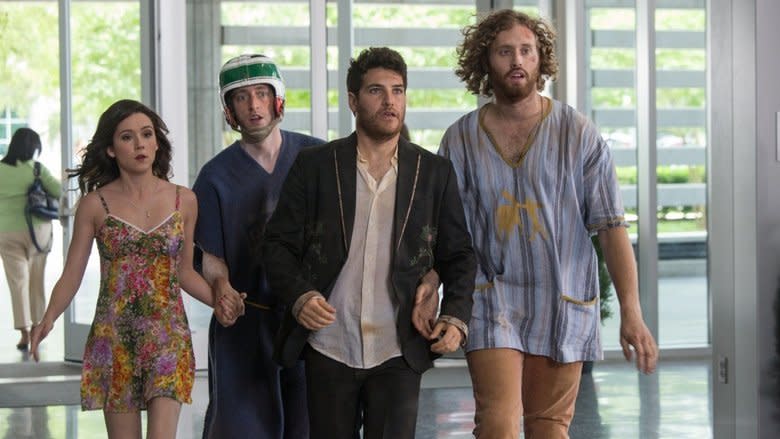
Search Party (2015)
“I had been offered a bunch of movies to direct, but I would always get the movie everyone else had passed on,” Armstrong said. “Like, 'No one else wants to direct this. Maybe Scot will.’” Instead of biting on one of those, Armstrong found a script (originally titled Road to Nardo) through his production company American Work (“which I’ve since closed because there were too many conference calls”) written by Mike Gagerman and Andrew Waller. He did a rewrite on it, shaped it into Search Party, and hired buddies from the improv circuit, who also happen to be three of the funniest young actors working: Middleditch (Silicon Valley), Miller (Deadpool), and Pally (Happy Endings).
Related: Watch Adam Pally and Tony Hale Reenact 'Captain America: Civil War’
Their characters — Nardo, Jason, and Evan — would probably hit it off with the Road Trippers, Old Schoolers, and Hangoverers(?) Armstrong has written in the past, and that’s no accident. “There’s a certain brand of guys that we like to write about, or bring into movies,” Armstrong said. “They’re fun, and they all have a passion and certain kind of lust for life. They want to take the world by storm, and have a good time.”
The comedy also features some callbacks to Armstrong’s previous work. There’s an exploding car a la Road Trip (“We didn’t have any money for special effects so when it blows up, it’s really blowing up”), gratuitous male nudity a la Old School (asked for how many days of the film’s 34-day shoot Middleditch was naked, Armstrong shoots back, “35”), and some marital misadventures a la The Hangover (Nardo is in Mexico trying to win back his ex-fiancee after Jason sabotages their wedding). And, of course, there’s plenty of laughs derived from Armstrong jokes you haven’t yet witnessed. Take, for instance, the vomiting donkey. The reason why they didn’t have any budget for those exploding cars? “ We used all our money for special effects on when the donkey throws up,” Armstrong laughed.
Search Party is now in theaters. Watch the trailer:


